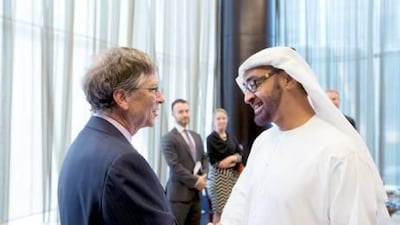Yesterday, a statement from an Emirati drug company announced that doses of the Sinopharm vaccine for Covid-19, which was trialled extensively in the UAE, are now being made in Ras Al Khaimah. There are plans to ramp up production to 2 million doses per month at a new plant in Abu Dhabi. Over time, manufacturing capacity is expected to reach 200 million doses per year.
Branded as Hayat-Vax – it has been renamed to indicate its origin, but uses the same vaccine formula developed in China by Beijing-based pharmaceutical giant Sinopharm – the dose will shore up domestic supplies in the event of shortages. Even more importantly, increased manufacturing capacity will boost the UAE's drive to give developing nations an equitable share of precious doses.
This success was in part the result of constructive diplomacy between the UAE and China, whose collaboration on the Sinopharm vaccine has led to this country having one of the leading inoculation programmes globally. It was not an achievement from one nation going it alone. Rather, it was the result of a strong bilateral partnership.
This week, Abu Dhabi has been at the heart of multilateral discussions advocating fairer vaccination against Covid-19. The city is hosting the virtual World Immunisation and Logistics Summit, organised by the UAE's Hope Consortium, a group that works to distribute vaccines across the globe. In attendance, Sheikh Abdullah bin Zayed, Minister of Foreign Affairs and International Co-operation, said: "The whole world has become bonded in a tight way and our plight has become one now – in a way that international health security depends now on the well-being of all societies."
Controlling the pandemic involves more than simply creating new medicines. In the words of Dr Tedros Adhanom Ghebreyesus, the director general of the WHO, "ultimately it’s not vaccines that save lives, it’s vaccinations".
Delivering these doses is a test of scientists, but it is also one for the many healthcare workers, manufacturers, logistical staff, diplomats and lawyers – to name only a few professions – whose input makes inoculation possible. Most importantly, it depends on the moral responsibility of richer nations, who are all too frequently shirking their duties to the rest of the world. The WHO is warning that the gap between the number of vaccines administered between rich and poor nations is growing every day, a scandal that slows the post-pandemic recovery, risking lives and the global economy.
In Abu Dhabi, attendees and stakeholders at the Hope Consortium's conference are pushing back and advocating a different future, with real success. Since its formation last year, the body has delivered 20 million doses to as many as 26 countries.
Writing in The National today, Mark Suzman, chief executive of the Bill & Melinda Gates Foundation – a close partner of the consortium – described the task ahead as a "test of our humanity and our ingenuity". Against the growing trend of vaccine nationalism, export controls and acrimony between old allies, rich nations would do well to take a page from the scientific community, and rediscover the benefit of collaboration.



